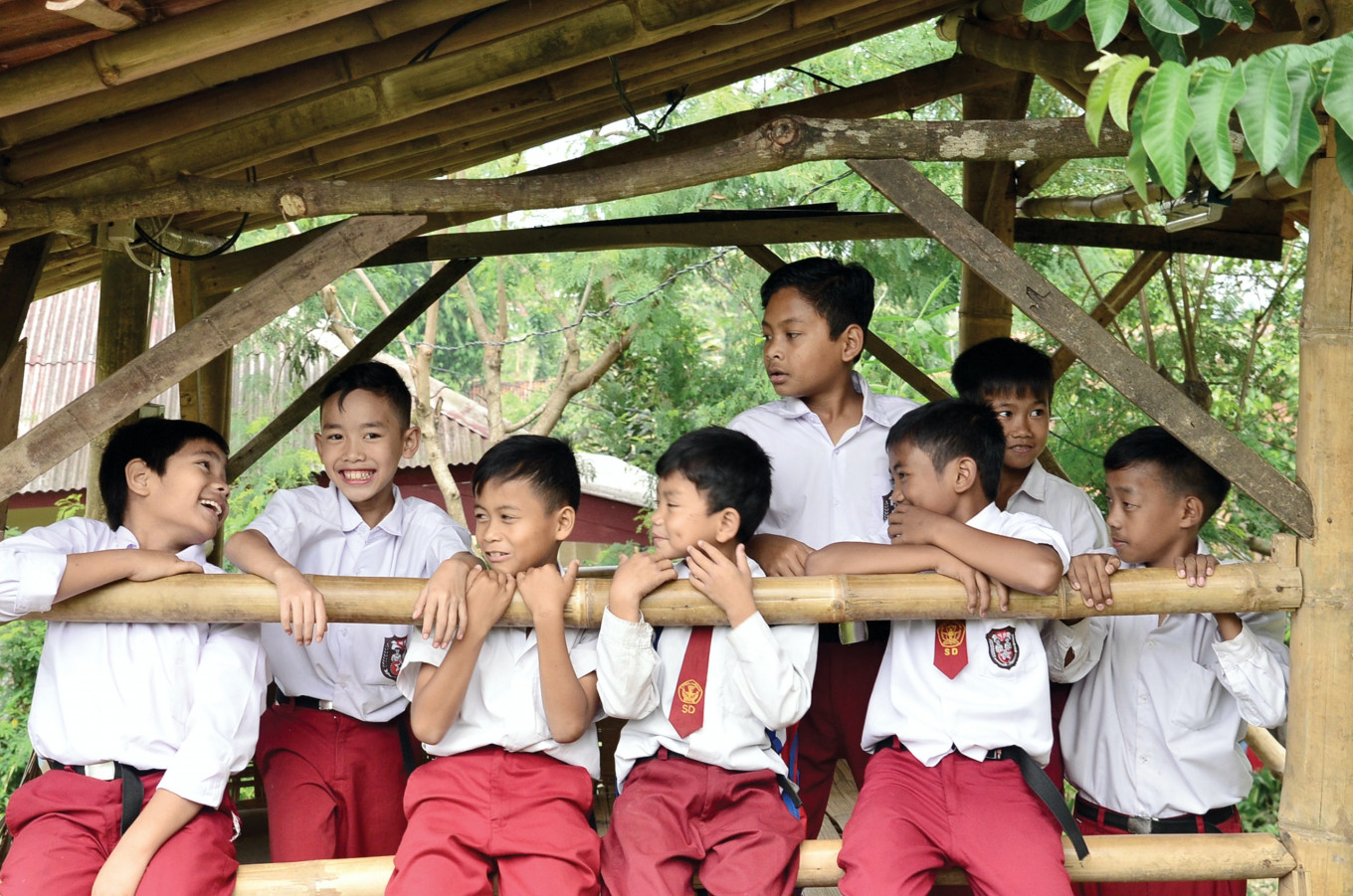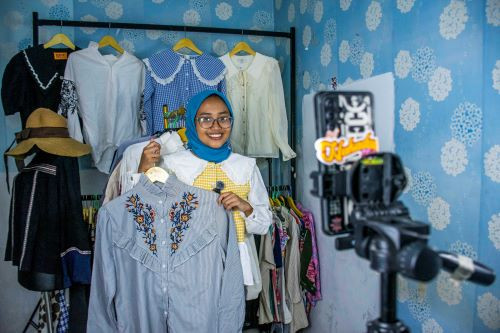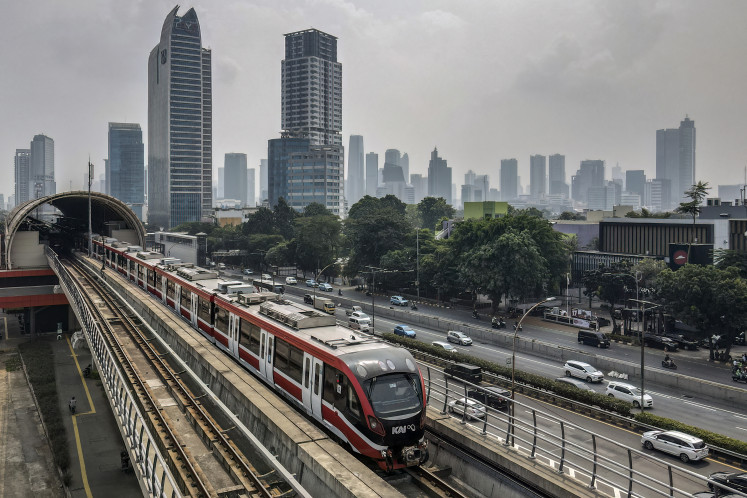Popular Reads
Top Results
Can't find what you're looking for?
View all search resultsPopular Reads
Top Results
Can't find what you're looking for?
View all search resultsUplifting children's well-being: APBN policies in Indonesia
Change text size
Gift Premium Articles
to Anyone
T
he government of Indonesia, a nation and state concerned about its future generations, has established specific policies in the State Budget (APBN) to enhance the well-being of children. These policies cover various aspects, including health, education and quality of life.
Health initiatives
In the APBN 2024, the government prioritizes children's health as a primary focus. This policy aims to enhance child health services, encompassing proactive programs like vaccination drives, regular health checkups and the provision of essential medication to effectively care for and maintain children's health.
These health initiatives aim to accelerate the reduction of stunting, a chronic issue related to children’s nutritional intake. This accelerated stunting reduction program involves refining the locations as well as interventions targeting the provision of supplementary food for 45,000 pregnant women with chronic energy deficiency (KEK) on an allocation of Rp 25.4 billion and 100,000 malnourished toddlers on an allocation of Rp 14.4 billion. Additionally, the First 1,000 Days of Life (HPK) program facilitate and provide mentoring to around 8.1 million families with infants and toddlers on an allocation of Rp 32.3 billion.
By paying special attention to stunting, the government aims to mitigate the adverse effects of chronic malnutrition on children's growth and development. This program not only offers short-term solutions through the provision of supplemental food, but also educates families through the HPK program, involving them in preventive and promotive measures to ensure optimal nutrition for children from an early age.
Through this proactive program, the government strives to reduce child mortality rates as wels as comprehensively improve the health of Indonesian children. By safeguarding children's health, the APBN actively contributes to building a strong foundation for the younger generation, which in turn will positively impact the nation's progress and welfare.
Educational programs
Efforts to enhance the quality of and access to education in Indonesia are reflected in various holistic initiatives. Expanding compulsory education and educational assistance comprise the foundation for improving educational access at all levels. Moreover, strengthening the quality and availability of Early Childhood Education (PAUD) is prioritized by optimizing regional allocations from the education budget, signaling the government's commitment to ensuring that every child receives solid educational groundwork from an early age.
Beyond elementary education, enhancing the quality of educational infrastructure, especially in Outermost, Frontier and Disadvantaged (3T) regions, is prioritized to ensure that every student receives equitable education. Accelerating the improvement of educational support facilities in these areas is increasingly vital to minimize educational inequality.
Furthermore, enhancing the competence of teachers and educational staff builds an indispensable foundation. By ensuring that educators possess up-to-date skills and knowledge, the government aims to provide quality and relevant learning that is aligned with the evolving times.
Strengthening vocational education through a direct link to the labor market embodies a long-term vision to create a workforce that is ready and relevant to industry demands. Through the "link and match" strategy, vocational education is directed toward producing graduates with the appropriate capacities and skills to enter the workforce.
Increased investment in education is the primary pillar for achieving these goals. By allocating sufficient resources, the government strives to build a robust educational foundation to positively impact individual development and enhance the nation's global competitiveness. Collectively, these efforts create an inclusive educational ecosystem focused on meeting the needs and potentials of every child.
Social aid and protection
In its efforts to provide protection and assistance to vulnerable families, the APBN has several specially designed social aid programs. These programs aim to offer comprehensive support covering finances, nutrition and special assistance for families and especially children that face economic challenges.
The financial aid disbursed through these programs is designed to provide direct support to families in need, assisting them in overcoming potential economic hardships. This approach aims to meet the families’ daily needs as well as provide them with financial security so they can focus on fulfilling their children's basic necessities.
Nutritional support is a crucial element of these social aid programs. The government is committed to ensuring that vulnerable children receive adequate nutritional intake. This includes distributing nutritious meals and providing education on healthy eating habits to ensure children’s optimal growth and development.
Through this holistic approach, the government asserts its commitment to improving societal conditions. The primary objective is to shield children from the negative impacts of poverty, grant them access to the resources necessary for optimal growth and form a stronger foundation for a better future. These social aid programs reflect the role of the APBN in sustaining and ensuring inclusivity in the country's socioeconomic development.
Child-focused infrastructure development
Infrastructure projects play a central role in responding to children's welfare through the APBN, with a specific focus on the development of education infrastructure. Recognizing that the quality of education facilities plays a pivotal role in shaping environments conducive to learning, the government prioritizes the construction, rehabilitation and renovation of elementary and secondary education facilities.
The education infrastructure development initiative targets 732 schools and involves building new schools, rehabilitating existing schools and renovating facilities that need upgrading. The primary focus on elementary and secondary education facilities underscores the government's seriousness in providing a robust educational foundation for children from early childhood through adolescence.
Education infrastructure development is not about merely constructing physical structures, it is an investment in children's futures. By creating modern, safe and standardized learning environments, these infrastructure projects aim to enhance the quality of education and create spaces where every student can flourish optimally to reach their potential.
Moreover, the education infrastructure development program will also positively impact surrounding communities. With adequate schools, children will have better access to quality education, consequently enhancing their standard of living and future opportunities.
These education infrastructure projects reflect the government's commitment to creating a sturdy and sustainable educational foundation. Adequate education infrastructure is not only a symbol of physical development, but also a manifestation of investing in the younger generation to shape a smarter, competitive and resilient society in the years to come.
Combating child labor
The APBN 2024 prioritizes combating child labor by allocating resources in line with international standards and human rights principles. This initiative involves a series of steps that go beyond law enforcement, incorporating educational campaigns and support programs for families to ensure that their children are not forced into work at the expense of their education and well-being.
Law enforcement efforts are integral to this initiative in ensuring that regulations prohibiting child labor are strictly enforced. These enforcement measures aim to deter violations and demonstrate serious consequences for offenders that infringe on children's rights. Monitoring and legal actions against cases of child labor signify the government's genuine commitment to ensuring the rigorous protection of children's rights.
Apart from law enforcement efforts, the APBN also promotes educational campaigns to increase awareness about the detrimental effects of child labor on children's physical and mental development. This public awareness program aims to change societal paradigms and provide better understanding about children's right to receive decent education free from exploitative work.
Furthermore, family support programs are key to addressing the root causes of child labor. The APBN fosters programs that empower families, particularly those vulnerable to child labor. These support programs involve financial assistance, skills training and health care access to alleviate the economic pressures that might drive them to force children into labor.
In this holistic approach, the APBN addresses the immediate consequences of child labor and endeavors to tackle its root causes through education, law enforcement and family support. Through these measures, the government is committed to creating an environment in which children can grow and flourish without compromising their fundamental rights.
Digital inclusion and literacy
The APBN 2024 recognizes the significance of digital literacy in the contemporary world and responds to it.
Source: The Finance Ministry











